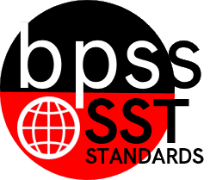6th Grade Standards
| All categories |
CIVICS |
|---|
SST-06.C.03.2
6th Grade (SST) Civics Domain: SST-06.C.03.2 Describe the impact of court cases on the rights and liberties of individuals.Guiding Topics: Judicial review, incorporation doctrine Student Learning Targets:Knowledge Targets
Reasoning Targets
Skills (Performance) Targets
Product Targets
Proficiency ScaleThe Student can ...1 Beginning... with help, demonstrate a partial understanding of some of the simpler details and processes (Score 2.0 content) and some of the more complex ideas and processes (Score 3.0 content).
2 Developing... demonstrate no major errors or omissions regarding the simpler details and processes but exhibits major errors or omissions regarding the more complex ideas and processes (Score 3.0 content).
3 Proficient“The Standard.”... demonstrate no major errors or omissions regarding any of the information and processes that were end of instruction expectations.
4 Advanced... demonstrate in-depth inferences and applications regarding more complex material that go beyond end of instruction expectations.
ResourcesVocabulary
Websites
| |
SST-06.C.04
6th Grade (SST) Social Studies
Civics Standard
SST-06.C.04 Investigate the role and responsibilities of citizenship in society.Benchmarks
Guiding Practice
The guiding topics for each benchmark includes various subject matter that can be used to help students reach the standard. Calculation Method for StandardsStandards are larger groups of related benchmarks. So the Standard is a calculation of all the related benchmarks. So click on the benchmark identifier below each Standards to access the learning targets and proficiency scales for each standard. | |
SST-06.C.04.1
6th Grade (SST)Civics Domain: SST-06.C.04.1 Explain how citizens can influence government.Guiding Topics: Interest groups, the media, political action committees, voluntary and civic associations, professional organizations, individuals, voting, running for office, petitioning the government, initiated measures, referendum, recall, peaceful protests, demonstrations Student Learning Targets:Knowledge Targets
Reasoning Targets
Skills (Performance) Targets
Product Targets
Proficiency ScaleThe Student can ...1 Beginning... with help, demonstrate a partial understanding of some of the simpler details and processes (Score 2.0 content) and some of the more complex ideas and processes (Score 3.0 content).
2 Developing... demonstrate no major errors or omissions regarding the simpler details and processes but exhibits major errors or omissions regarding the more complex ideas and processes (Score 3.0 content).
3 Proficient“The Standard.”... demonstrate no major errors or omissions regarding any of the information and processes that were end of instruction expectations.
4 Advanced... demonstrate in-depth inferences and applications regarding more complex material that go beyond end of instruction expectations.
ResourcesVocabulary
Websites
| |
SST-06.C.04.2
6th Grade (SST) Civics Domain: SST-06.C.04.2 Describe and evaluate the criteria and process for naturalization in the United States.Guiding Topics: Citizenship test and pledge, historic and present restrictions and requirements for naturalization Student Learning Targets:Knowledge Targets
Reasoning Targets
Skills (Performance) Targets
Product Targets
Proficiency ScaleThe Student can ...1 Beginning... with help, demonstrate a partial understanding of some of the simpler details and processes (Score 2.0 content) and some of the more complex ideas and processes (Score 3.0 content).
2 Developing... demonstrate no major errors or omissions regarding the simpler details and processes but exhibits major errors or omissions regarding the more complex ideas and processes (Score 3.0 content).
3 Proficient“The Standard.”... demonstrate no major errors or omissions regarding any of the information and processes that were end of instruction expectations.
4 Advanced... demonstrate in-depth inferences and applications regarding more complex material that go beyond end of instruction expectations.
ResourcesVocabulary
Websites
| |
SST-06.C.04.3 6th Grade (SST) Civics Domain: SST-06.C.04.3 Explain how citizens’ personal and civic responsibilities are important to the preservation and improvement of United States constitutional republic.Guiding Topics: Voting rights, running for public office, obeying the law, being informed and attentive to public issues, monitoring political leaders and governmental agencies, assuming leadership when appropriate, paying taxes, registering to vote and voting knowledgeably on candidates and issues, serving as a juror, serving in the armed forces, performing public service Student Learning Targets:Knowledge Targets
Reasoning Targets
Skills (Performance) Targets
Product Targets
Proficiency ScaleThe Student can ...1 Beginning... with help, demonstrate a partial understanding of some of the simpler details and processes (Score 2.0 content) and some of the more complex ideas and processes (Score 3.0 content).
2 Developing... demonstrate no major errors or omissions regarding the simpler details and processes but exhibits major errors or omissions regarding the more complex ideas and processes (Score 3.0 content).
3 Proficient“The Standard.”... demonstrate no major errors or omissions regarding any of the information and processes that were end of instruction expectations.
4 Advanced... demonstrate in-depth inferences and applications regarding more complex material that go beyond end of instruction expectations.
ResourcesVocabulary
Websites
| |
SST-06.C.04.4
6th Grade (SST) Civics Domain: SST-06.C.04.4 Identify bias and evaluate its role in media sources.Guiding Topics: Broadcast news, print news, websites, social media, speeches, and other primary and secondary sources Student Learning Targets:Knowledge Targets
Reasoning Targets
Skills (Performance) Targets
Product Targets
Proficiency ScaleThe Student can ...1 Beginning... with help, demonstrate a partial understanding of some of the simpler details and processes (Score 2.0 content) and some of the more complex ideas and processes (Score 3.0 content).
2 Developing... demonstrate no major errors or omissions regarding the simpler details and processes but exhibits major errors or omissions regarding the more complex ideas and processes (Score 3.0 content).
3 Proficient“The Standard.”... demonstrate no major errors or omissions regarding any of the information and processes that were end of instruction expectations.
4 Advanced... demonstrate in-depth inferences and applications regarding more complex material that go beyond end of instruction expectations.
ResourcesVocabulary
Websites
| |
SST-06.C.04.5
6th Grade (SST) Civics Domain: SST-06.C.04.5 Demonstrate active participation in civic life.Guiding Topics: Voting, attending political and governmental meetings, contacting public officials, working in campaigns, community organizing, demonstrating or picketing, mock trials, simulated congressional hearings, Socratic seminar, civil discourse, debate, boycotting, joining interest groups or political action committees, etc. Student Learning Targets:Knowledge Targets
Reasoning Targets
Skills (Performance) Targets
Product Targets
Proficiency ScaleThe Student can ...1 Beginning... with help, demonstrate a partial understanding of some of the simpler details and processes (Score 2.0 content) and some of the more complex ideas and processes (Score 3.0 content).
2 Developing... demonstrate no major errors or omissions regarding the simpler details and processes but exhibits major errors or omissions regarding the more complex ideas and processes (Score 3.0 content).
3 Proficient“The Standard.”... demonstrate no major errors or omissions regarding any of the information and processes that were end of instruction expectations.
4 Advanced... demonstrate in-depth inferences and applications regarding more complex material that go beyond end of instruction expectations.
ResourcesVocabulary
Websites
| |
ECONOMICS |
|---|
SST-06.E
6-8 Social StudiesEconomics DomainStandards
DescriptionAt the middle school level, basic economic principles are best integrated within United States history, world history, and geography. The knowledge of names and definitions is essential for acquiring knowledge; however, high-quality teaching and learning demands more than merely mastering facts and terms. Therefore, in teaching these standards, it is encouraged to use an active economic inquiry approach. Activities and assessments that require students to think, analyze, synthesize, evaluate, compare, contrast, and argue using economic habits of mind should be emphasized.. Calculation Method for DomainsDomains are larger groups of related Standards with benchmarks. So the Domain is a calculation of all the related standards that calculate to the benchmarks. So click on the benchmark identifier below each Standards to access the learning targets and proficiency scales for each standard. | |
SST-06.E.016th Grade (SST) Social Studies
Economics Standard
SST-06.E.01 Analyze the concept of scarcity when making economic decisions.Benchmarks
Guiding Practice
The guiding topics for each benchmark includes various subject matter that can be used to help students reach the standard. Calculation Method for StandardsStandards are larger groups of related benchmarks. So the Standard is a calculation of all the related benchmarks. So click on the benchmark identifier below each Standards to access the learning targets and proficiency scales for each standard. | |
